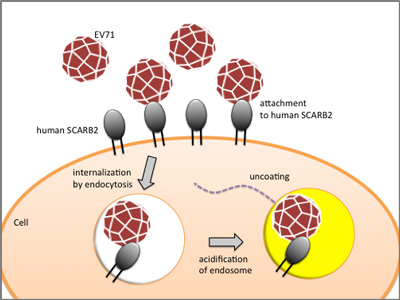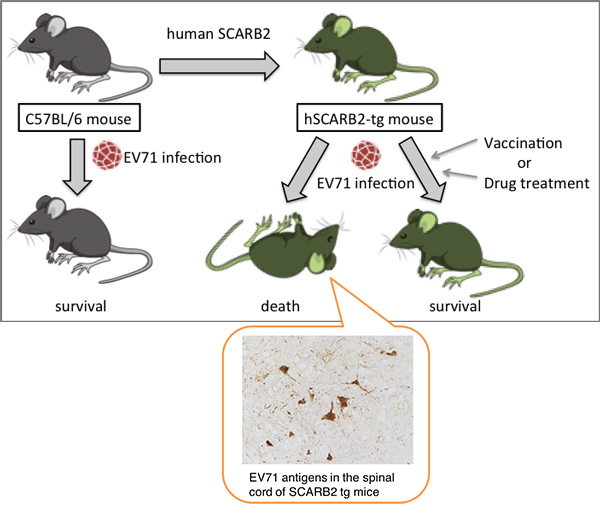
- HOME
- Neurovirology Project
Neurovirology Project
Mechanism of viral infection and development of vaccines
Research Summary
Enterovirus 71 (EV71), a human enterovirus species A of the genus Enterovirus within the Picornaviridae family, is known to be one of the causative agents of hand-foot-and-mouth disease (HFMD). HFMD is generally a mild and self-limiting disease. However, in some infants and young children, HFMD caused predominantly by EV71 can be complicated by neurological manifestations. Thus, EV71 infection is a serious public health concern. Unfortunately, there is still very little information concerning EV71 pathogenesis, and vaccines or anti-EV71 drugs have yet to be developed.
Research Topics
Mechanism of Enterovirus 71 infection

We recently found that Scavenger receptor B2 (SCARB2) is a receptor for EV71. SCARB2 plays a central role in early stages of EV71 infection. SCARB2 is able to mediate binding of the virus at the cell surface, internalization of the virus and initiation of uncoating.
Development of an animal model for Enterovirus 71 infection

Transgenic mice expressing human SCARB2 are susceptible to EV71, and are a useful model for the study of EV71 pathogenesis and vaccine efficacy.
Selected Publications
- Miwatashi W, et al. (2022)”Mouse Scarb2 Modulates EV-A71 Pathogenicity in Neonatal Mice.” J. Virol.,96:(15)e0056122
- Tamura K, et al. (2022) “TAK - 021, an inactivated Enterovirus 71 vaccine candidate, provides cross-protection against heterologous sub-genogroups in human scavenger receptor B2 transgenic mice.” Vaccine,40:(24)3330-7
- Kobayashi K, et al. (2021) “Virulence of Enterovirus A71 Fluctuates Depending on the Phylogenetic Clade Formed in the Epidemic Year and Epidemic Region.” J. Virol.,95:(23)e0151521
- Kobayashi K, et al. (2020) “Heparan sulfate attachment receptor is a major selection factor for attenuated enterovirus 71 mutants during cell culture adaptation.” PLoS Pathog., 18:16(3)e1008428
- Imura A, et al. (2020) “Development of an Enterovirus 71 Vaccine Efficacy Test Using Human Scavenger Receptor B2 Transgenic Mice.” J. Virol., 94:(6)e01921-19
- Kobayashi K, et al. (2018) “Amino Acid Variation at VP1-145 of Enterovirus 71 Determines Attachment Receptor Usage and Neurovirulence in Human Scavenger Receptor B2 Transgenic Mice.” J. Virol., 92:(15)e00681-18
